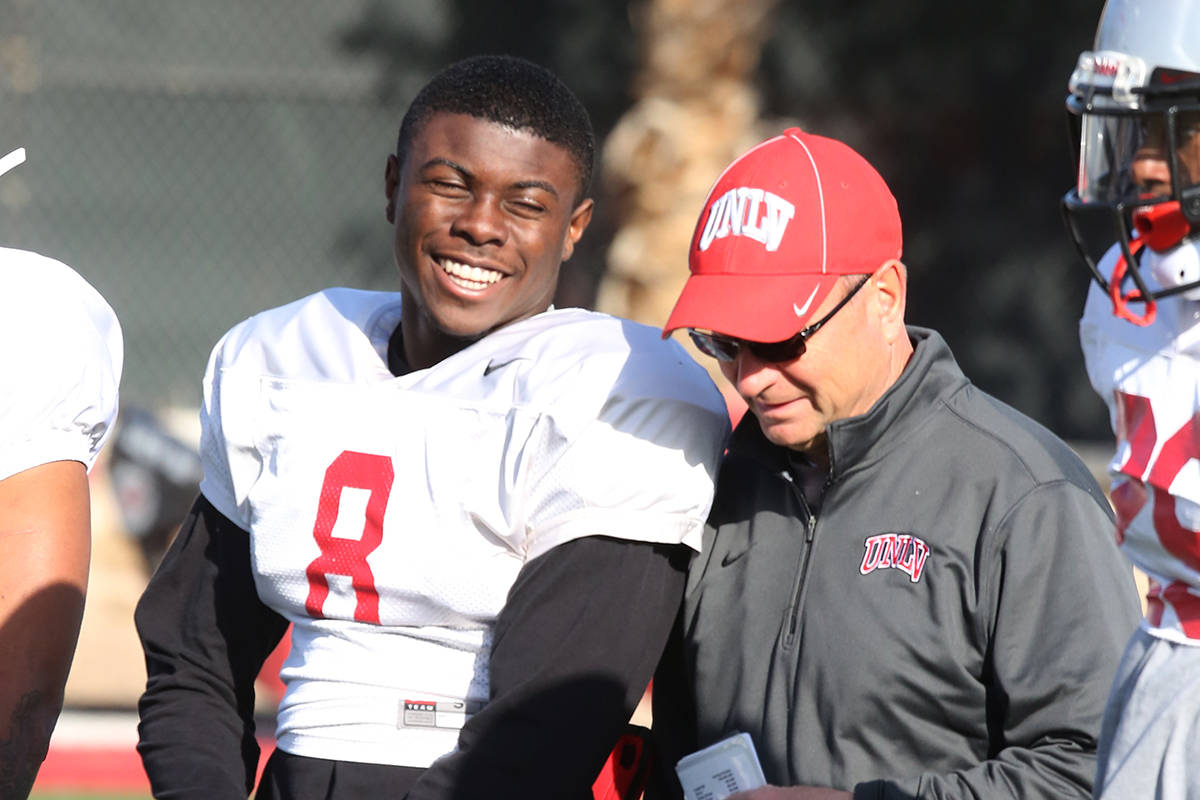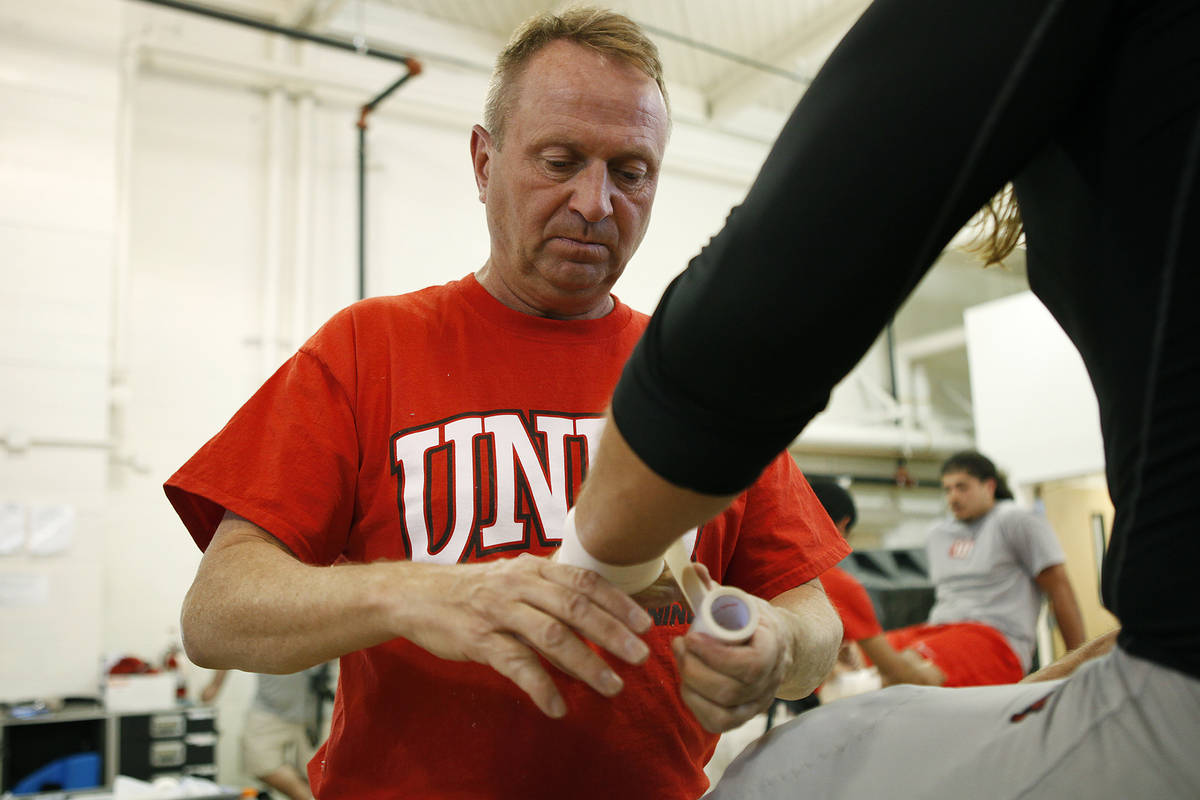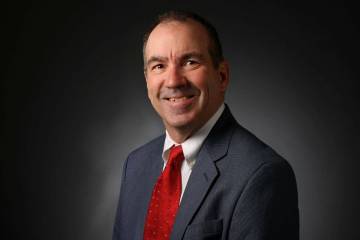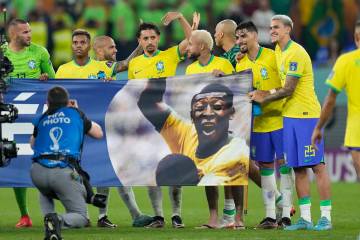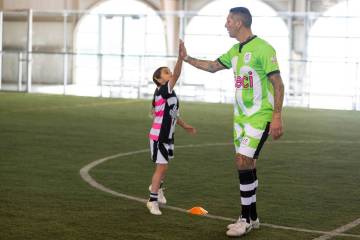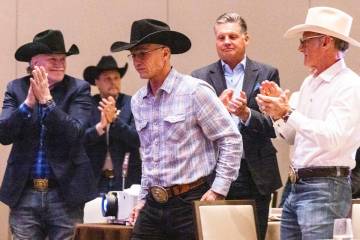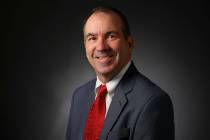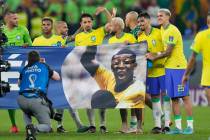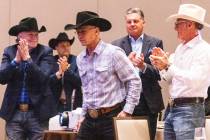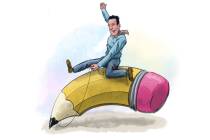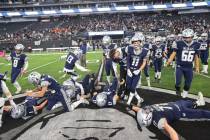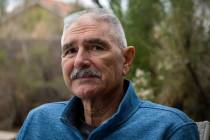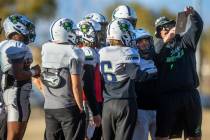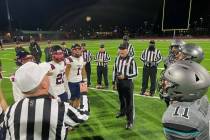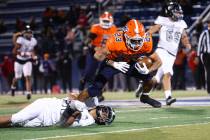UNLV fires football trainer Kyle Wilson after 36 years
After 36 seasons as UNLV’s football trainer, Kyle Wilson was highly efficient at taping ankles.
He could wrap one in less than a minute. Which is roughly how long it took UNLV to terminate him.
The firing squad slid a sheet of paper across a desk. It said Wilson could be let go without cause. This happened around 1:30 p.m. on a recent Thursday. He was told to be out of the building by 5.
It would have taken him longer than that to take down all the photographs and award plaques he had accumulated.
He was allowed to come back on Saturday, when no one was around, to do it. That and two months’ pay were his parting gifts.
UNLV hired another new football coach during the offseason and talked again about changing the culture of a losing program.
Who knew it was the trainer’s fault?
Wilson not only was a loyal employee of the athletic department for nearly four decades, he was a supporter of it. An original member of 335 Club, the baseball team’s unofficial booster group, he spent part of his $65,000 salary on baseball season tickets each season.
He never spoke a harsh word about UNLV. Not even when he was dismissed without explanation.
“I was able to work with Fred Dallimore in baseball; we went to several (NCAA) regionals when I was his trainer,” Wilson, 61, said. “My first year in 1984 with Harvey Hyde, we beat Toledo in the California Bowl. In ’94 with Jeff Horton we won the Las Vegas Bowl; in 2000 with John Robinson, we beat Arkansas in a bowl game. That was huge.”
Wilson also was assistant trainer for the Rebels’ powerhouse men’s basketball team from 1984 through the national champion season of 1990 and said “those were great teams and great coaching staffs to be around.”
Citing university protocol regarding personnel matters, a UNLV spokesman said there would be no comment on Kyle Wilson. That’s unfortunate because his is one case where just two words would have said so much.
Thank you.
Around the horn
— Las Vegas Events president Pat Christenson said he was not aware of speculation the Pro Rodeo Cowboys Association might consider its old stamping ground of Oklahoma City as an alternate site for the National Finals Rodeo should holding it with a full arena of spectators at the Thomas & Mack Center in December not be viable due to the coronavirus.
“No, but we are getting closer to determining a timeline for when we will decide what we’re going to do,” he said. “I think we’re going to announce more of that next week.”
In these extraordinary times, we are reminded of the power of community and all of the things that we hold dear. This is a tribute to the fans of rodeo as we spend our time #AloneTogether. Brighter days are ahead, and when that day comes, we’ll be ready. pic.twitter.com/3MKQdq6Yzc
— Wrangler National Finals Rodeo (@LasVegasNFR) April 10, 2020
— With being on a bubble or in one having become catchphrases, a reader asked how and where the bubble originated in a sporting context.
Contrary to popular belief, it had nothing to do with Joe Lunardi and a March Madness bracket.
According to internet sources, the term originated at Indianapolis Motor Speedway during the 1970s. Drivers whose qualifying speeds were in jeopardy of not being fast enough to make the 33-car field for the Indianapolis 500 were said to be “on the bubble” during the last day of time trials, also known as “Bump Day.”
But with only 33 cars entered for next Sunday’s virus-postponed race, the bubble will remain under lock and key this year in Gasoline Alley .
Binge watching the British TV series "Shetland" on @netflix this afternoon. Just heard one of the characters explain the phrase "on the bubble" by mentioning the #Indy500 How cool is that? It's not May yet, but the 500 is everywhere. @IMS
— Jeri Anderson 🇺🇸 (@IUredhead) March 11, 2019
— Which, said Tuukka Rask, might be the perfect place for it. The Boston goaltender sounded off when asked about competing for Lord Stanley’s Cup in an insulated environment.
“To be honest with you, it doesn’t really feel like playoff hockey out there,” the former Vezina Trophy winner said after the Bruins’ 3-2 loss to the Carolina Hurricanes Thursday. “There are no fans, so it’s kind of like playing an exhibition game. It’s definitely not a playoff atmosphere.
“When you’re playing at a home rink and an away rink and the fans are cheering for and against you, it really creates a buzz for the series. There’s none of that. So it just feels, like, dull at times. I’m not stressing too much about results and whatnot.”
Then on Saturday, Rask left the bubble to spend time with his wife and newborn baby. He issued a statement saying there are more important things than hockey and thanked his teammates for their support.
Here are Tuukka Rask's full comments on the atmosphere up in Toronto: pic.twitter.com/5qQU4BDA3N
— Conor Ryan (@ConorRyan_93) August 14, 2020
0:01
— Former hockey superstar Bobby Clarke, describing the old Philadelphia Flyers’ hellbent style:
“We take the shortest route to the puck and arrive in ill humor.”
Memorable @NHLFlyers vs. @CanadiensMTL playoff moments: Pre-game brawl before Game 6 of 1987 Wales Conference Finals. pic.twitter.com/mzxMEHuSHb
— Bill Meltzer (@billmeltzer) August 10, 2020
Contact Ron Kantowski at rkantowski@reviewjournal.com or 702-383-0352. Follow @ronkantowski on Twitter.



